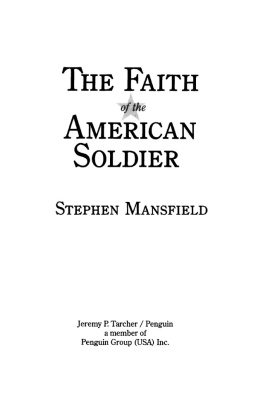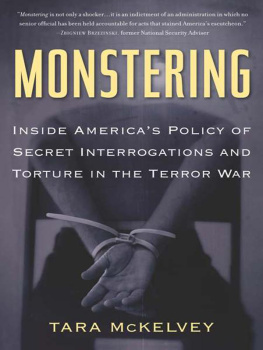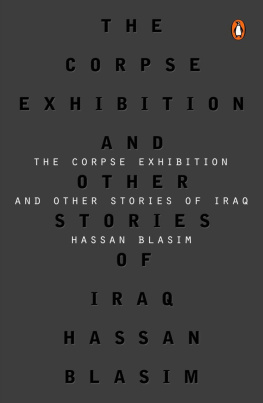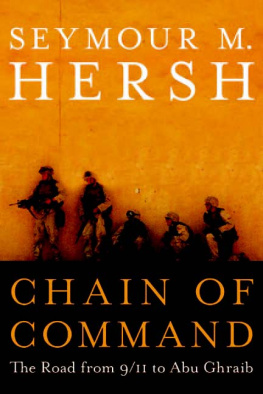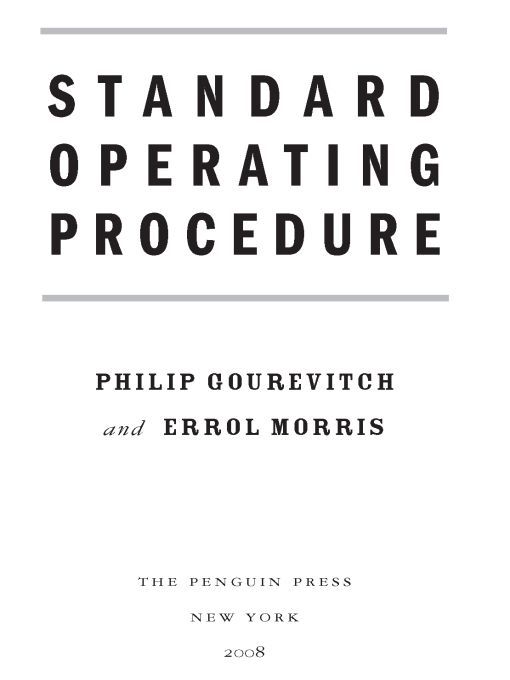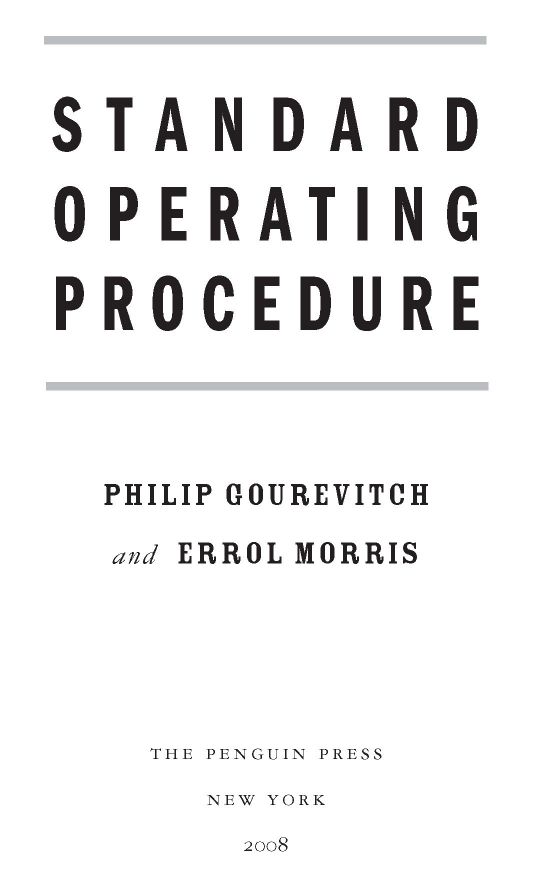Table of Contents
ALSO BY PHILIP GOUREVITCH
We Wish To Inform You That We Will Be Killed With Our Families:
stories from Rwanda
A Cold Case
For L.M. & J.S.
A NOTE ON AUTHORSHIP
This book is written by Philip Gourevitch. It is a collaborative work, which stems from a year and a half of continuous conversations with Errol Morris about the hundreds of hours of interviews he conducted and the thousands of documents that he collected for his motion picture of the same title, Standard Operating Procedure. All speech quoted in the text is drawn from those interviews and documents, and a complete description of these sources appears at the back of the book.
That which is possible is inevitable...
Allons! Commenons la danse.
WILLIAM CARLOS WILLIAMS
BAGHDAD
October 2002
ONE SUNDAY MORNING, the president released all the prisoners. Nobody knew why. Maybe even he didnt know. The announcement was read on the radio. It was the presidents way, the announcer said, of thanking the people for reelecting him a few days earlier in a national referendum. Everyone knew the referendum was a charaderunning unopposed, Saddam Hussein had claimed a hundred percent of the voteyet the announcement of the prison amnesty (complete, comprehensive, and final, except for Zionist and American spies) was greeted with real excitement in the streets, much honking of car horns and celebratory firing of assault rifles. All at once, all over the country, people began to mass outside prison gates, believing that they might see again someone long missing: a thief or an intellectual, a democracy advocate or a rapist.
Saddams prisons were the engine houses of his power, factories of terror and annihilation. For stealing a chicken or a bottle of shampoo you could be locked away for years. For crimes against the statereal or imaginedthere was no limit to the torture. Wednesdays and Sundays were hanging days at Abu Ghraib prison, twenty miles west of Baghdad. It was not unusual for a hundred people a week to have their necks snapped on the gallows, and when overcrowding made it hard to accommodate new prisoners, the death house worked overtime. Abu Ghraib was the biggest of Saddams prisons, and the most notorious, a synonym for living hell, and it was there, where the outer fringe of Baghdads suburban sprawl met the flat drab waste of desert beyond the airport, that word of the amnesty drew the largest spontaneous gathering that anyone could remember seeing in Iraq.
By late morning, it appeared that there were as many Iraqis milling outside the walls of Abu Ghraib as there were prisoners inside ten to fifteen thousand, the reports saidand thousands more kept arriving from every direction. At midday the outside mob was estimated to be fifty thousand strong, and when it surged, it tore the despised prison gate off its hinges, and spilled inside. There, coming toward it, was another mob of thousands: the prisoners, harrowed, unwashed, weeping, clutching the foul bedrolls that were their only belongings, seeking the way out. Prisoners too weak to walk emerged draped over their cellmates shoulders, while others, even though they were fit, were trampled to death on the verge of release. In this pandemonium and cacophony some guards joined in the carnival mood of liberation, ripping bricks from dungeon walls to free those inside, and dancing happily with their former wards; and some guards, less adaptable, kept beating prisoners until there were none left at hand. It was said that some even took the opportunity to perform a few final executions.
In this way, an entire penal system was disbanded, and as many as a hundred fifty thousand convicts set loose. Nothing of the kind had ever happened before anywhere in the worldand on that same day, Saddam sponsored a nationwide mass wedding. Hundreds of couples were married at once, and again the radio explained the occasion as a celebration of the presidents reelection. There was more honking of car horns, more gunfire in the streets. The state outfitted the brides from top to toe: dress, veil, shoes, handbag, gloves. Only the dresses had to be returned.
Prisoners, bridessuch pageantry, such wild emotion. There it was, for all to see, and seeing it hardly made it comprehensible. What was Saddam up to?
The president of the United States was threatening to take over his country. The threat was personal and unrelenting. There was great impatience in Washington to get on with the war: to do Iraqthat was the phrase. After all, who would mourn Saddam, with his dungeons and torture chambers? Nobodythat was one of the arguments. So, when Saddam opened Abu Ghraib, it was reported that he was knuckling under, or at least kowtowing, trying to make nice, to appease; and that without firing a shot or landing a boot on Iraqi soil, we had made him relinquish one of the most sinister instruments of his regime. Several foreign newspapermen even compared that Sunday at Abu Ghraib to the storming of the Bastille at the outset of the French Revolution: the moment when a people asserted its sovereignty and set an absolute ruler back on his heels. The analogy was recklessly wishful. In reality, the emptying of Iraqs prisons was just one more caprice of the tyrantnot a concession, but an assertion of power.
Amid the lunatic riot of conflicting impressions that came out of Abu Ghraibthe crawling stench and hellish filth, the sudden crack of pistol shots to calm the crowd, the wailing of a mother who found her son, the wailing of a mother who learned her son had already been put to death, the crazed eyes of captives suddenly set looseperhaps the most astonishing spectacle was that of fleeing convicts, chanting until they were hoarse: Our blood, our souls, well sacrifice for you, oh Saddam.
PART 1
BEFORE
Ten months later, in August 2003, Lane McCotter and Gary Deland, two former executive directors of the Utah Department of Corrections, were driving around Baghdad, trying to find a metal worker who could make bunk beds. McCotter and Deland had spent the summer refurbishing a couple of cell blocks at Abu Ghraib. In the old days, under Saddam, the cells were unfurnished and prisoners slept on the floor. There were no standards, McCotter said. They just crammed them in there like cordwood. He thought bunks would be a nice touch to mark the prisons transformation. But Iraqis didnt know what he was talking about. One bed on top of another? We had to draw pictures of them, he said. We finally found someone. He made a prototype, we made changes to it, and we bought a thousand of them as fast as he could make them to start putting in these cells.
Deland took photographs of McCotter standing proudly beside Iraqs first bunk beds. Deland was proud too. In July he had set up Iraqs first ever corrections academy, and the first class of new Iraqi prison guards was just completing its training. McCotter and Deland decided to show off their work at Abu Ghraib with an open house and a graduation ceremony for the corrections academy. They were getting ready to go hometheir contract with the United States Justice Department ran out at the end of the monthso they invited their colleagues from the Coalition Provisional Authority and the Army and the incipient Iraqi Ministry of Justice; they told some of the soldiers at Abu Ghraibs military prison camp to come on over; they hired buses for the corrections graduates and told them to bring their families; they laid on food; they even hired an Iraqi bagpipe-and-drum band. The worst sound Ive ever heard, Deland said. You couldnt exaggerate how hard that was on the ears.




